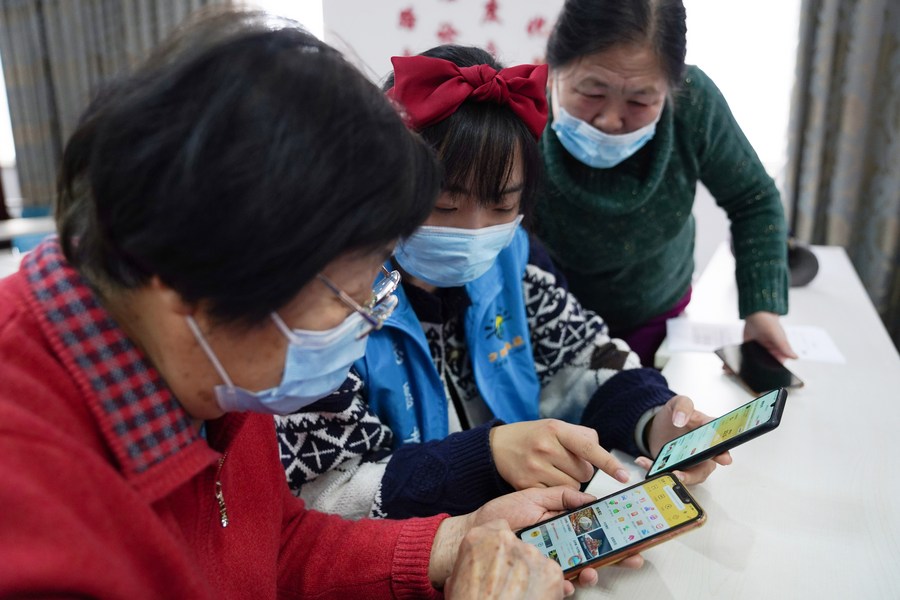More Chinese seniors becoming internet-savvy

A student volunteer (C) from Beijing Foreign Studies University teaches senior residents learn how to order food using mobile phone at a community activity center in Haidian District, Beijing, capital of China, Dec. 8, 2020. (Xinhua/Ju Huanzong)
NANJING, Oct. 14 (Xinhua) -- For Chen Yuzhen, a 65-year-old retiree in the city of Suzhou, east China's Jiangsu Province, there are three things she almost must do every day: watch short videos, browse online shops, and devour e-books.
"I can watch so many funny videos on Douyin (the Chinese version of TikTok), and I can even buy fresh vegetables on e-commerce platforms. And as a big fan of novels, I find it so convenient to read books online," said Chen.
More Chinese seniors are embracing the digital world as mobile technologies, like smartphones and high-speed internet services, are booming in the world's second-largest economy.
"You can stay up to date on the latest news, keep in touch with friends, and shop until you drop. It feels like your access to the world is at your fingertips," Chen said, adding that elderly people like her are enjoying the benefits of being powered up and plugged in.
According to a recent report released by the China Internet Network Information Center, the total number of internet users in China had exceeded 1 billion as of June 2021. Netizens aged 50 and above accounted for 28 percent, a year-on-year increase of 5.2 percentage points.
Chinese authorities have issued a series of policies to lower tech barriers for seniors. The State Council launched an initiative to help seniors bridge the digital divide in late 2020, introducing a set of measures to help the elderly better adjust to technological innovations.
While the guideline requires relevant parties to keep non-digital services, it also encourages tech companies to tailor their products for seniors.
The plan sets objectives for the 2020-2022 period focusing on seven types of services and scenarios frequently encountered by the elderly, such as healthcare, recreational activities, transportation, and civic services.
Hardware and software manufacturers are rolling out new features to help older people access digital technology.
Chinese tech giant Huawei has introduced a "simple mode" service for its senior smartphone users and a smart voice assistant to create family-like companionship. Railway ticket reservation website 12306.cn has provided a text-to-speech service for seniors with failing eyesight.
"Now the tiny font sizes on phone screens and physical difficulty in typing are no longer issues perplexing the seniors who like navigating the internet," said Cheng Kun, general manager of the input method business unit of iFLYTEK, an artificial intelligence and speech technology company in China.
"While more seniors are dabbling in social media and absorbing a wealth of information, they are also easy victims for online fraud and theft," said Wang Peng, deputy director of Jiangsu Communications Administration. Wang added that it is necessary to offer training programs for these "silver-haired surfers."
Jiangsu, home to more than 18 million elderly residents, is promoting activities to help them get familiar with smart devices. The capital city of Nanjing, for example, has opened smartphone training courses at over 700 elderly universities.
A growing number of seniors like Chen Yuzhen has become internet-savvy. "Being curious and keeping pace with the times will keep us forever young," she said.
Photos
Related Stories
Copyright © 2021 People's Daily Online. All Rights Reserved.










